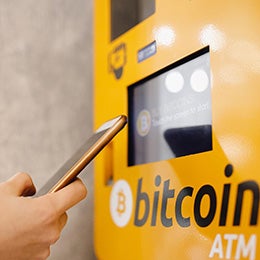
Three compelling reasons to consider S&P 500 Equal Weight
Discover market conditions that could make an equal-weight approach worth considering for gaining a more balanced exposure to large-cap US equity benchmarks.
As one of the world’s largest ETF providers with over US$1 trillion globally in ETF assets under management, we’ve been dedicated to ETF
investing since 2003.
We offer over 160 EMEA ETFs spanning regions and strategies across equities, fixed income and commodities.
Our culture of innovation lets us find new opportunities for investors, as well as ways to improve the performance of core ETF exposures.
Our ETF range includes some of the lowest-cost products on the market tracking major equity, fixed income and commodity benchmarks, including those providing access to innovative strategies and more specialist market segments, some not available from any other ETF issuer.











Sign up to discover and receive relevant emails about our ETF offering of over 140 equity, commodity, and fixed income products across a range of strategies.
You can update your selection or unsubscribe at any time.
Buying and selling Invesco products is as straightforward as buying and selling ordinary stocks and shares.

Three compelling reasons to consider S&P 500 Equal Weight
Discover market conditions that could make an equal-weight approach worth considering for gaining a more balanced exposure to large-cap US equity benchmarks.

Equal Weight: A common-sense approach
Unlike market-cap indices, which naturally concentrate exposure in the largest companies, Equal Weight strategies assign the same weight to each constituent. Invesco’s Equal Weight UCITS ETFs offer access to this approach across both global, US and European markets.

Key takeaways from our 2026 annual investment outlook webinar
Experts from equities, fixed income, real estate, alternatives, and more discuss where they see opportunities and risks in 2026.

Getting more out of your cash allocation
Discover alternative cash management solutions that may be able to offer enhanced returns versus overnight deposit rates.

The rise of bitcoin and why it matters now
Investing in digital assets is now easier than ever with Bitcoin ETPs becoming more accessible globally. Learn more about the rise of bitcoin and why it matters now.
An Exchange Traded Fund (ETF) is a pooled investment vehicle with shares that can be bought and sold throughout the day on the stock exchange, in the same way that ordinary stocks and shares are traded.
Exchange Traded Commodities (ETCs) are listed debt instruments traded on a stock exchange and backed by a commodity. They are not funds or ETFs.
ETFs and mutual funds both offer diversified exposure to main asset classes and are typically UCITS funds. However, ETFs can be bought through a stockbroker or trading platform at any time during the trading day, while mutual funds are purchased via a fund management company and only once per day. ETFs are priced continuously throughout the day, providing high transparency, whereas mutual funds are priced once daily and their transparency can vary.
Benefits:
Low cost of ownership – ETFs tend to be cheaper than most other funds.
Liquidity – Creation/redemption process ensures liquidity
Ease of trading – ETFs can be traded on a stock exchange at any time, when open. May be an attractive feature for investors who are looking for more flexibility around when to buy and sell an investment.
Transparency – ETFs are very transparent and usually disclose their full list of holdings daily on the ETF provider’s website.
Index tracking – Physical and synthetic replication models may offer economic advantages
Risks:
Tracking differences: ETFs may not track an index perfectly. The difference between the fund return and index return is called ‘tracking difference’.
Capital risk: Like any investment product, the value of an ETF may go down as well as up, and you may not get back the amount invested.
You would typically buy and sell ETFs through a stockbroker or online trading platform, just like ordinary stocks and shares.
While buying and selling our ETFs is usually quite straightforward, you may wish to speak to us first especially if you have a particularly large or complex trade.
Our Capital Markets team serves as the central point of contact for both primary and secondary market activity for our European-domiciled ETFs and ETCs. They can help guide you to find the most suitable and cost-effective way to buy or switch into one of our ETFs or ETCs, based on your individual preferences. They can also provide you with a pre-trade cost analysis, free and without obligation.
There are many ways for fund managers to track the performance of an index. These ‘replication methods’ fall into two broad categories, physical and swap-based (synthetic).
Physical ETFs own the underlying stocks or bonds that comprise the benchmark index; whereas a swap-based ETF aims to deliver the index performance through a swap provided by an investment bank. A swap is a type of derivative contract where two parties agree to exchange (“swap”) one stream of flows for another.
At Invesco, we pioneered a swap-based method called “physical with swap overlay” whereby the ETF holds a basket of quality securities, which are not the same as those in the index but are expected to produce most of the returns. To reduce tracking error, the ETF has swaps often with multiple counterparties (investment banks) that pay the difference between the index return and the return of the basket of securities.
Learn more about physical and swap-based ETFs
Smart beta is a term for any rules-based strategy that uses characteristics other than just geography and market capitalisation to select and weight the securities of the index.